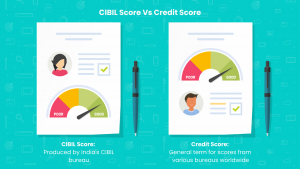In the financial domain, terms like CIBIL score and credit score are common, especially when applying for credit cards or loans. For those new to the credit landscape, understanding the difference between a CIBIL score and a credit score is crucial for their financial journey. Whether as an individual or a business, credit plays a vital role in achieving financial goals such as buying a home, a car, or starting a business. Lenders require assurance that borrowers will repay their debts, and to assess their creditworthiness, credit scores offer detailed insights. CIBIL, as a credit reference agency, calculates an individual’s creditworthiness, influencing lenders’ decisions. To navigate this terrain effectively, it’s essential to comprehend the key differences between CIBIL score and credit score.
CIBIL Score Basics
CIBIL stands for Credit Information Bureau (India) Limited, which is one of the four credit information companies or credit bureaus in India, the others being Equifax, Experian, and CRIF High Mark. The CIBIL score, often referred to as the CIBIL TransUnion Score, is a three-digit numerical representation of an individual’s creditworthiness. It is based on an individual’s credit history and credit behavior. With a scale spanning 300 to 900, the CIBIL credit score holds significance in the approval process for credit cards or loans. As the score approaches 900, the probability of approval rises. A CIBIL Score exceeding 750 is deemed favorable, aiding lenders in assessing and approving loan applications.
Key aspects of CIBIL Score
- Credit bureau: CIBIL scores are generated by the Credit Information Bureau of India Limited, and they are specific to this bureau.
- Credit report source: CIBIL scores are derived from the credit reports maintained by CIBIL, which contain a person’s credit-related information.
- Range: CIBIL scores typically range from 300 to 900, with a higher score indicating better creditworthiness.
- Credit history: The CIBIL score primarily relies on an individual’s credit history, including loan and credit card payments, outstanding debts, defaults, and credit utilization.
- Lender perspective: Lenders use CIBIL scores to assess an applicant’s creditworthiness when deciding whether to approve a loan or credit application.
- Credit report accuracy: Ensuring the accuracy of information in the CIBIL credit report is essential, as errors can affect the CIBIL score.
- Credit Score:
The term “credit score” is a more generic term used worldwide to refer to a numerical representation of an individual’s creditworthiness. It is not specific to any particular credit bureau or credit reporting agency.
Key aspects of Credit Score
- Credit bureau: Credit scores can be generated by various credit bureaus, including CIBIL, Equifax, Experian, and others.
- Credit report source: Credit scores are derived from the credit reports maintained by various credit reporting agencies, not limited to CIBIL.
- Range: Credit scores can vary in terms of the numerical range and scoring models used by different bureaus.
- Credit history: Like the CIBIL score, a credit score also relies on an individual’s credit history, payment behavior, and other credit-related factors.
- Lender perspective: Lenders may use various credit scores, depending on their preferences or agreements with specific credit bureaus.
- Credit report accuracy: Just as with CIBIL scores, the accuracy of the information in your credit reports from all relevant bureaus is essential.
CIBIL Score Vs Credit Score: Understand the Key Differences

1. Different Credit Bureaus, Different Scores: Different countries and regions have different credit bureaus that use their own scoring models. In the United States, for example, FICO (Fair Isaac Corporation) scores and VantageScore are two common credit scoring models.
2. Scoring Algorithms: Even within a country, different credit bureaus might use slightly different algorithms to calculate credit scores. This can result in variations in scores between bureaus.
3. Credit Score Range: The range of credit scores can vary. For example, FICO scores in the U.S. range from 300 to 850, while in other countries, the range might be different.
4. Data Sources: Credit scores are calculated based on information from credit reports. The types of data considered and the weight assigned to different factors can vary between scoring models.
5. Purpose of Scores: Credit scores are used for various purposes, such as determining an individual’s creditworthiness when applying for loans or credit cards. However, different scoring models may place different emphasis on certain factors, impacting the final score.
6. Industry-Specific Scores: In addition to general credit scores, there are industry-specific scores. For example, there are scores tailored for the auto loan industry or the mortgage industry, which may weigh certain factors more heavily based on the specific needs of those sectors.
7. Updating Frequency: The frequency at which credit scores are updated can vary. Some models update more frequently than others, depending on how often the credit bureaus receive new information.
It’s important to note that while there may be differences in the details of how credit scores are calculated, the underlying principle is to assess an individual’s credit risk. The Difference Between CIBIL Score and Credit Score lies in the specific models and methodologies used by various credit bureaus or agencies. However, regardless of the scoring model, responsible financial behavior (paying bills on time and managing credit responsibly) generally leads to higher credit scores.
Criteria for CIBIL Score and Credit Score

Tech Trends in Credit Scoring in India
AI-based credit scoring leverages advanced algorithms and machine learning models to analyze vast datasets, providing a more nuanced and predictive assessment of an individual’s creditworthiness. This innovation not only streamlines the evaluation process but also enables a more accurate risk assessment by considering a broader spectrum of factors. By harnessing the power of AI, credit scoring in India is evolving to be more adaptive, inclusive, and reflective of an individual’s financial behavior, contributing to a more efficient and fair credit ecosystem.
A recent update by RBI in the credit scoring landscape
On October 26, 2023, the Reserve Bank of India (RBI) introduced new directives aimed at enhancing transparency and accessibility in the credit information ecosystem. Credit information companies (CICs) are now required to notify clients via email or SMS whenever banks or non-banking finance companies (NBFCs) access their Credit Information Report (CIR). This move is designed to keep individuals informed about who is accessing their credit information.
In addition, the RBI mandates that credit institutions, including banks and NBFCs, must proactively notify customers via SMS or email when they submit information to CICs regarding defaults or Days Past Due (DPD) on existing credit. This notification ensures that individuals are promptly informed about any adverse entries in their credit history.
Addressing the concern of access to credit scores, the RBI has directed CICs to facilitate easy access to a “Free Full Credit Report (FFCR),” inclusive of the credit score. Individuals whose credit history is available with the CIC can avail of this FFCR once in every calendar year (January–December). The RBI emphasizes the importance of making the link to the FFCR prominently visible on the CIC’s website, ensuring convenient and free access for individuals to monitor their credit reports and scores regularly. This regulatory initiative aims to empower consumers with greater control and awareness of their credit information. The implementation of these directives is expected to take effect within six months.
Transforming India’s Credit Scoring with AI and Consumer Empowerment
India’s credit-scoring industry is expected to undergo a radical transition characterized by innovation, accessibility, and greater consumer empowerment. The integration of cutting-edge technologies, such as Artificial Intelligence and machine learning, is set to revolutionize the accuracy and efficiency of credit assessments. With regulatory initiatives focusing on transparency and free access to credit reports, individuals can anticipate a more informed and secure credit landscape. As financial institutions embrace advanced analytics and alternative data sources, the traditional barriers to credit may dissolve, fostering financial inclusion. The evolving credit scoring landscape reflects a dynamic synergy between technological advancements, regulatory foresight, and a commitment to empowering individuals on their financial journeys in the digital age.
In Conclusion
In summary, while the terms are often used interchangeably, it’s important to recognize the differences between “CIBIL score” and “credit score”. A CIBIL score is a unique credit score produced by India’s most well-known credit bureau, CIBIL. Conversely, a credit score is a more all-encompassing term for a creditworthiness score that is produced by different credit bureaus across the globe. Understanding the nuances of these scores is essential for managing your financial health and making informed credit decisions. Remember to regularly review your credit reports and scores from all relevant bureaus to ensure their accuracy and take steps to improve your creditworthiness.
FAQs:
1. What is a Credit Score, and how is it different from a CIBIL Score?
A credit score is a numerical representation of an individual’s creditworthiness, while a CIBIL Score is a specific type of credit score provided by the Credit Information Bureau of India Limited (CIBIL). CIBIL Score is widely used by lenders in India.
2. How is a Credit Score calculated?
Credit scores are calculated using various factors, including payment history, credit utilization, credit mix, length of credit history, and new credit accounts. These factors provide a comprehensive overview of an individual’s credit behavior.
3. What is a good CIBIL Score?
A good CIBIL Score typically falls above 750 on a scale of 300 to 900. Lenders consider scores in this range as a positive indicator of creditworthiness, increasing the likelihood of loan approvals at favorable terms.
4. How often should I check my Credit Score?
It is advisable to check your credit score at least once a year to monitor your credit health. Regular monitoring helps identify any discrepancies or unauthorized activities and allows you to take corrective measures if needed.
5. Can I improve my Credit Score?
Yes, you can improve your credit score by making timely payments, reducing credit card balances, diversifying your credit mix, and avoiding unnecessary credit inquiries. Consistent, responsible financial behavior positively impacts your score over time.
6. How long does negative information impact my credit score?
The impact of negative information, such as late payments or defaults, on your credit score gradually diminishes over time. While specific timelines vary, negative information typically remains on your credit report for seven years.
7. Does checking my credit score frequently affect it?
No, checking your own credit score, known as a soft inquiry, does not impact your credit score. However, hard inquiries initiated by lenders when reviewing your credit for loan applications may have a minor, short-term effect on your score.






